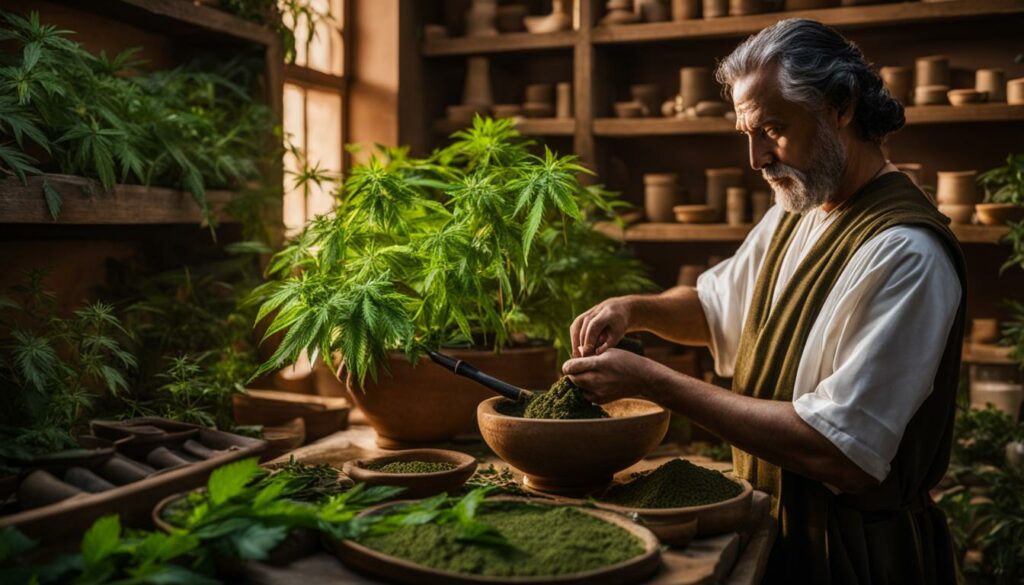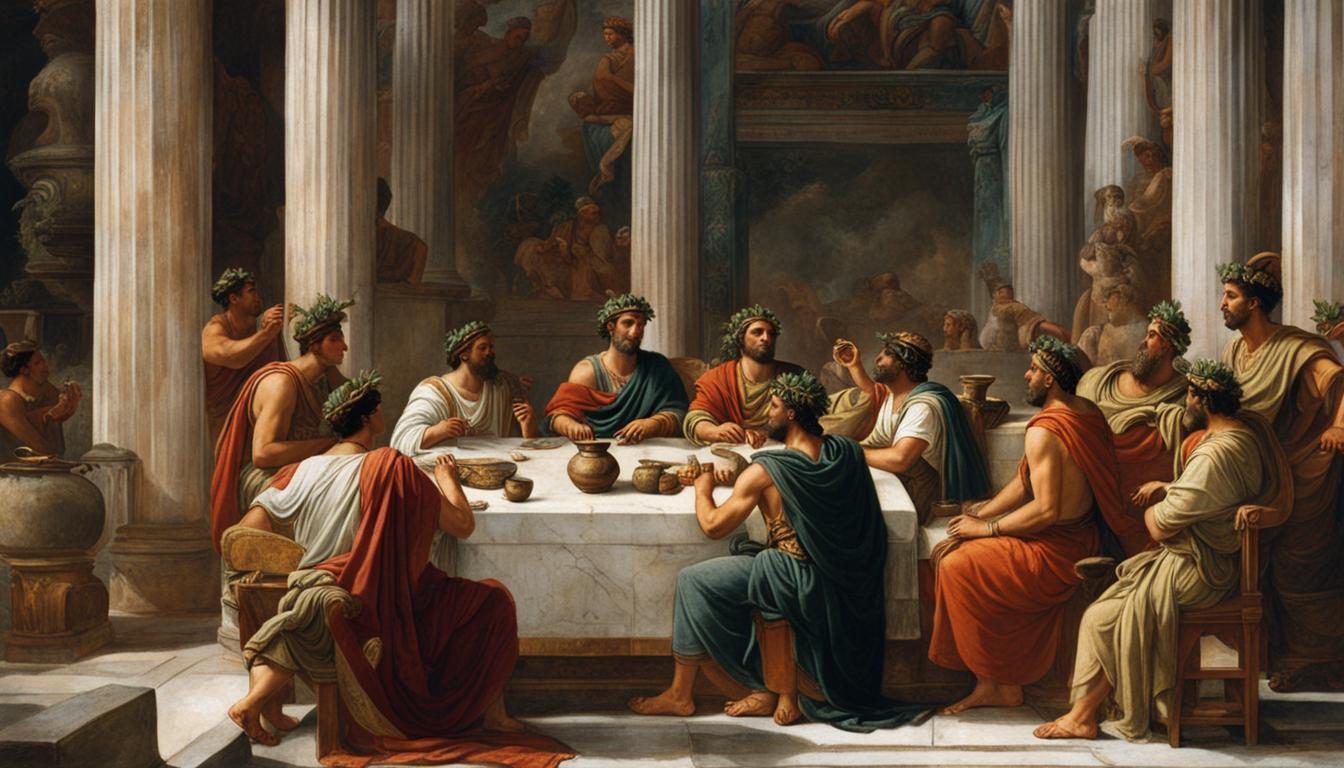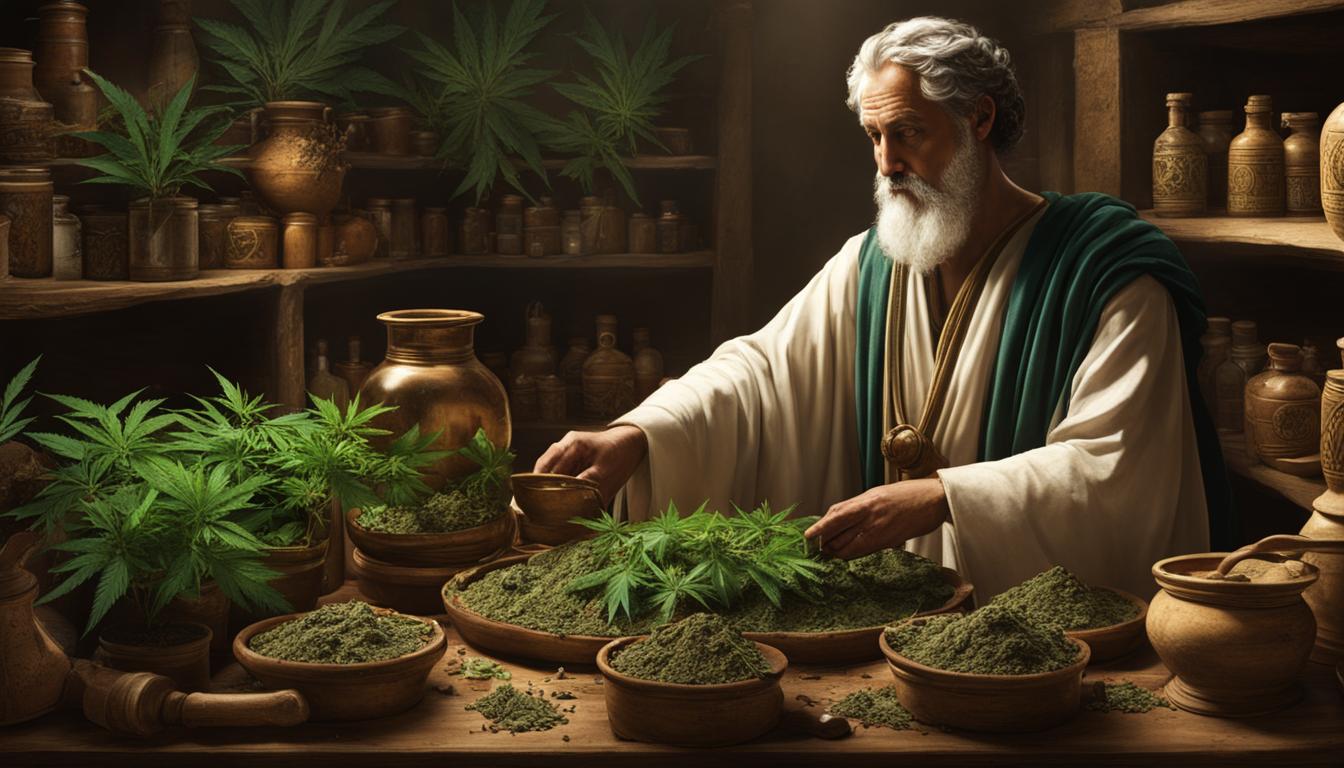Discover the intriguing relationship between Roman culture and cannabis as we delve into the historical context, medical practices, religious beliefs, and societal attitudes surrounding this ancient plant. From its use in medicine to its role in religious ceremonies, cannabis held significance in the fabric of ancient Roman society.
Explore the Roman perspective on cannabis and uncover the captivating details of how cannabis was viewed and utilized in ancient Rome. From the historical use of cannabis to the attitudes of Roman society, we uncover the cultural significance and legacy of this plant in the ancient world.
Cannabis in Ancient Greek and Roman Medicine
During ancient times, cannabis played a significant role in the medical practices of both Greek and Roman cultures. Ancient Roman medical literature, such as the writings of Dioscorides and Galen, provided detailed information on the various uses of cannabis in treating different ailments. In fact, cannabis was commonly utilized as a remedy for conditions such as insomnia, pain, coughs, and digestive issues.
These ancient texts also mentioned that cannabis was believed to have adverse effects on sexual activity, potentially causing impotence. To create different remedies, cannabis was often combined with wine or other ingredients. However, it’s worth noting that while the presence of cannabis in ancient Roman medicine is evident in textual sources, there is no direct archaeological evidence confirming its use.
To better understand the significance of cannabis in ancient Greek and Roman medicine, it is important to analyze the writings of Dioscorides and Galen. Their works provide valuable insights into the medical uses of cannabis during that time period. The table below summarizes the medical conditions for which cannabis was prescribed and the potential effects it was believed to have.
| Medical Conditions | Effects of Cannabis |
|---|---|
| Insomnia | Induces sleep |
| Pain | Relieves pain |
| Coughs | Suppresses coughing |
| Digestive Issues | Relieves digestive discomfort |
| Sexual Activity | Decreases sexual desire, potentially causing impotence |
While the precise extent of cannabis use in ancient Roman medicine remains uncertain, the texts provide valuable insights into the historical use of cannabis for therapeutic purposes. These ancient practices pave the way for ongoing discussions and research into the potential medical benefits of cannabis today.

The writings of Dioscorides and Galen
“Cannabis was commonly utilized as a remedy for insomnia, pain, coughs, digestive issues, and it was even believed to decrease sexual activity.”
By examining these historical perspectives on cannabis in ancient Greek and Roman medicine, we gain a deeper understanding of the cultural and medical significance of this plant during that time. The legacy of cannabis in ancient Roman medicine continues to be a subject of research and exploration, shedding light on the potential benefits and applications of this ancient remedy.
Cannabis in Ancient Greek and Roman Religion and Recreation
The ancient Greeks and Romans had a deep connection between cannabis and their religious and recreational practices. References in ancient texts indicate the presence of cannabis in rituals, ceremonies, festivities, and celebrations. The plant held a significant role in these cultural contexts, although the exact extent of its use is still a subject of debate.
In ancient Roman rituals, cannabis was believed to have a drying effect and induce a warm feeling when consumed in large quantities. It may have been associated with altered states of consciousness, making it a prominent element in religious ceremonies. While the specifics of these rituals are not well-documented, the written records suggest that cannabis played a role in fostering spiritual experiences and enhancing the connection between humans and the divine.
Ancient Roman festivities and celebrations also saw the use of cannabis. The warm and euphoric effects of the plant may have contributed to the joyful and ecstatic atmosphere of these events. Cannabis may have been consumed in various forms during festivals, adding to the overall sense of merriment and revelry.
“The presence of cannabis in ancient Greek and Roman religion and recreation highlights the significance it held in the cultural and social fabric of these ancient civilizations.”
The Cultural Significance of Cannabis in Ancient Rome
The use of cannabis in religious and recreational contexts underscored its cultural significance in ancient Rome. It was intertwined with the spiritual and social practices of the time, serving as a conduit for transcendent experiences and collective celebration. Although the precise details of these rituals and festivities remain somewhat elusive, their existence emphasizes the enduring fascination with cannabis and its role in human culture throughout history.
| Religious Context | Recreational Context |
|---|---|
| References in ancient texts suggest cannabis was used in religious ceremonies | Cannabis consumption in large quantities induced warm feelings and altered states of consciousness during festivals and celebrations |
| The plant may have played a role in fostering spiritual experiences and enhancing the connection between humans and the divine | Cannabis added to the overall sense of merriment and revelry during festivities |
| Exact details of these rituals are not well-documented, but the written records indicate their existence | The warm and euphoric effects of cannabis contributed to the joyful atmosphere of events |
Historical Context of Cannabis in Ancient Greece and Rome
In order to understand the role of cannabis in ancient Greek and Roman cultures, it is important to consider the historical context in which it was cultivated and traded. Cannabis was not exclusive to Greece and Rome, but rather it was part of a broader network of trade routes in the ancient Mediterranean. These routes connected regions such as China, India, Asia, the Middle East, and Africa, allowing for the exchange of goods, ideas, and cultures.
The cultivation and trade of cannabis in ancient times contributed to its availability and widespread use across different societies. The plant was valued for its versatile properties, including its use as a fiber for textiles, its medicinal properties, and its role in religious and recreational practices. Its significance in the ancient Mediterranean demonstrates the enduring human fascination with cannabis and its myriad applications.
To further explore the historical context of cannabis, we can examine the archaeological evidence related to its cultivation and trade. Ancient artifacts and writings provide insights into the cultivation techniques employed, the trading routes established, and the societal significance of cannabis. By examining these sources, we can gain a deeper understanding of how cannabis was perceived and utilized in ancient Greece and Rome.
Ancient Cannabis Trade Routes
| Region | Role in Cannabis Trade |
|---|---|
| China | Major exporter of cannabis textiles |
| India | Significant producer of cannabis for medicinal use |
| Middle East | Hub for cannabis trade and distribution |
| Africa | Used cannabis for religious ceremonies and recreational purposes |
As evidenced by the ancient cannabis trade routes, cannabis had a wide geographical reach and played a significant role in the economies and cultures of different regions. The exchange of cannabis-related products and knowledge contributed to the development of diverse traditions and practices surrounding its use.
Understanding the historical context of cannabis in ancient Greece and Rome provides valuable insights into the perspectives and attitudes towards this plant. By examining the trade routes and the cultural significance of cannabis in the ancient Mediterranean, we can appreciate the enduring legacy of cannabis in these societies and its ongoing impact on modern perspectives and discussions.
Roman Society’s Attitudes towards Cannabis and Other Drugs
Ancient Roman society held a complex set of attitudes towards drugs, including cannabis. While cannabis was used for medicinal purposes, excessive drug use, including alcohol, was seen as detrimental to social order. Ancient authors and philosophers such as Pliny and Seneca warned against the dangers of intoxication, highlighting the potential negative effects it could have on individuals and society as a whole. Within this context, cannabis use may have been viewed as taboo or less socially acceptable in ancient Rome.
Drugs played a significant role in ancient Roman society, but the level of acceptability varied depending on the substance and its perceived effects. While there is evidence of cannabis being used medicinally, it is important to note that the ancient Romans were cautious about the potential dangers of intoxication. The Roman perspective on drug use was rooted in maintaining social harmony and order, with excessive drug use seen as a threat to the stability of society.
Despite cautionary views on drug use, ancient Roman society did not entirely abstain from substances like cannabis. The Romans appreciated the therapeutic properties of cannabis and utilized it within the boundaries of their social norms. It is evident that cannabis held a place in ancient Roman culture, although the extent of its use remains somewhat elusive due to limited archaeological evidence. The cultural significance and attitudes towards cannabis and other drugs in ancient Rome provide valuable insights into the social dynamics and values of that time.
Cultural Significance and Legacy of Cannabis in Ancient Rome
When exploring the ancient Roman culture, it is fascinating to uncover the customs and traditions surrounding cannabis. While our knowledge of cannabis use in ancient Rome may be limited, the available evidence suggests that it held a significant place in their society. Cannabis was known for its diverse applications, ranging from medicine to religious ceremonies and even recreational use.
Ancient Roman customs and cannabis intertwined in various aspects of their daily lives. This versatile plant found its way into medical practices, where it was used as a treatment for ailments such as insomnia, pain, coughs, and digestive issues. The historical impact of cannabis in Rome can be seen through the writings of renowned physicians like Dioscorides and Galen, who documented its effectiveness in their medical texts.
“Cannabis has the power to bring warmth and a drying effect when consumed in large quantities.” – Ancient Roman Text
Aside from medicine, cannabis also played a role in ancient Roman culture as a part of religious rituals and celebrations. While the exact extent of its use in these contexts remains a mystery, the references in ancient texts indicate its presence. Some believe that cannabis may have been associated with altered states of consciousness, further highlighting its significance in their religious practices.
The legacy of cannabis use in ancient Rome continues to influence modern perspectives and discussions surrounding the plant. As we delve into the cultural significance and customs of the Romans, it becomes clear that cannabis held a special place in their society. While we may not have a complete understanding of its role, the echoes of its historical relevance remain embedded within our ongoing fascination with this ancient culture.
Conclusion
The ancient Romans had a fascinating relationship with cannabis, utilizing it in various aspects of their culture. Although the full extent of cannabis use in ancient Roman society remains unknown, evidence suggests that it was employed for medicinal, religious, and recreational purposes. The historical context of cannabis in ancient Greece and Rome reveals its wide-ranging significance, as it was traded and cultivated across the ancient Mediterranean.
Roman medical literature, such as the writings of Dioscorides and Galen, mentions cannabis as a treatment for ailments including insomnia, pain, and digestive issues. Additionally, cannabis was believed to have effects on sexual activity. While cannabis use may have been taboo or less socially acceptable, the plant still held a place within the complex fabric of ancient Roman culture.
The cultural significance and legacy of cannabis in ancient Rome are evident in its enduring impact on modern perspectives. Today, discussions surrounding cannabis continue to explore its potential applications, reflecting the timeless human fascination with this plant. By understanding the historical cannabis use in ancient Rome, we gain insights into the rich tapestry of Roman culture and its relationship with intoxicating substances.
FAQ
Did the ancient Greeks and Romans use cannabis?
While there is no concrete evidence of day-to-day cannabis use, ancient Roman medical literature mentions cannabis as a treatment for various ailments. Some scholars believe that cannabis and psychedelics were likely consumed by the ancient Greeks and Romans for therapeutic, recreational, or spiritual purposes.
How was cannabis used in ancient Roman medicine?
Ancient Roman medical literature mentions cannabis as a treatment for conditions such as insomnia, pain, coughs, and digestive issues. It was also believed to decrease sexual activity and cause impotence. Cannabis was often used in conjunction with wine or other ingredients to create various remedies.
Was cannabis used in ancient Greek and Roman religious practices?
Ancient Greek and Roman texts make references to cannabis in relation to religious and recreational practices. It was used in certain religious ceremonies and may have been associated with altered states of consciousness. The exact extent of cannabis use in these contexts is unclear, but its presence in ancient religious and recreational practices is evident in the written records.
Where was cannabis traded in ancient times?
Cannabis was traded throughout the ancient Mediterranean, including regions such as China, India, Asia, the Middle East, and Africa. The plant was used for various purposes, such as medicine, religion, and recreation.
Were drugs, including cannabis, socially accepted in ancient Roman society?
Roman society had mixed attitudes towards drugs, including cannabis. While it was used for medicinal purposes, excessive use of drugs, including alcohol, was seen as detrimental to social order. Cannabis use may have been seen as taboo or less socially acceptable in ancient Rome.
What is the cultural significance and legacy of cannabis in ancient Rome?
Cannabis played a role in ancient Roman society, being used for various purposes, including medicine, religion, and recreation. Its presence in ancient Roman culture highlights the complex relationship between the plant and the people of that time. The legacy of cannabis use can be seen in its ongoing influence on modern perspectives and discussions surrounding the plant.








